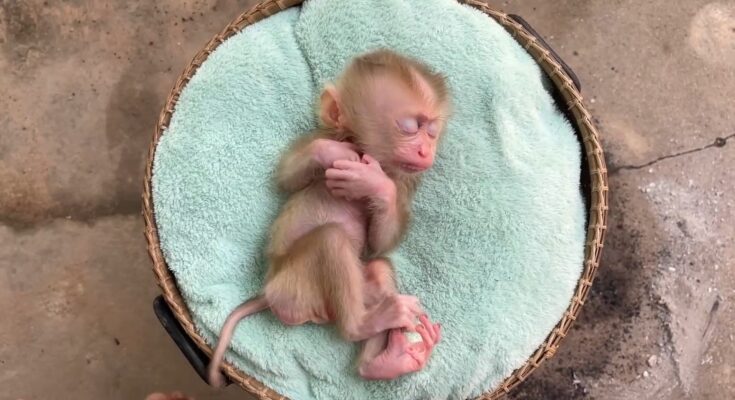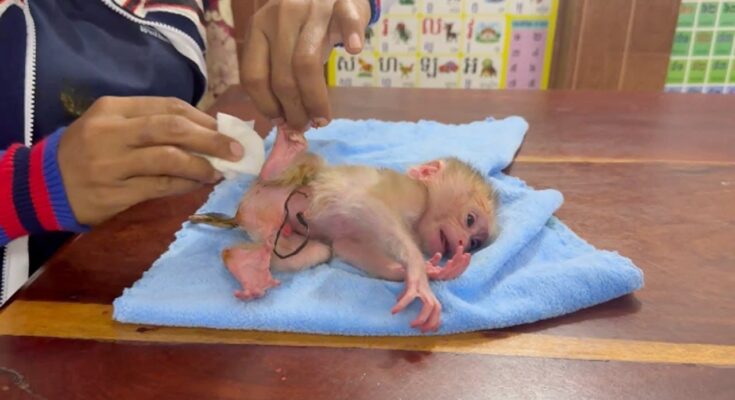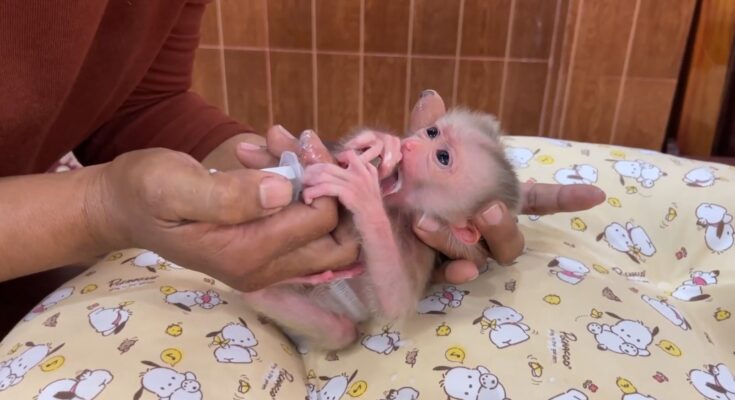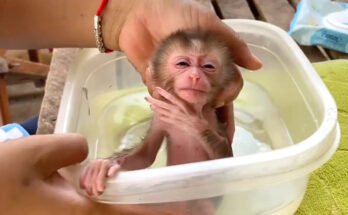Discover Essential Tips for Raising a Newborn Baby Monkey! 🐒✨ From bonding basics to health care, learn how to give your baby monkey the best start. Dive into the world of primate parenting and uncover expert advice on nutrition, safe handling, and creating a nurturing environment. Whether you’re a first-time caregiver or an animal enthusiast, these tips will help ensure your little one’s growth and happiness. Start your journey with confidence!
Baby monkeys’ charm lies in their human-like behaviors, from curious expressions to mischievous antics. Their intelligence and emotional depth often make people feel a strong connection to them. On social media, videos of baby monkeys playing, eating, or cuddling often go viral, proving just how much people adore these tiny primates.
Top 5 Facts About Baby Monkeys
- Born to Cling: Baby monkeys are born with a strong grip, allowing them to cling to their mother’s fur. This trait helps them stay safe while their mothers move around.
- Playful Learning: Playtime isn’t just fun; it’s essential. Through play, baby monkeys develop social skills, coordination, and survival instincts.
- Diverse Diets: While adult monkeys may eat fruits, leaves, or insects, baby monkeys primarily rely on their mother’s milk for nutrition during their early months.
- Unique Calls: Each species has distinct sounds, and baby monkeys often make high-pitched calls to communicate with their mothers.
- Fast Learners: Baby monkeys observe and mimic adult behavior, quickly picking up essential skills for survival in their environment.
A Baby Monkey’s Heartbreaking Moment That Will Leave You in Tears

Welcome Your Baby Monkey with Love! 🐒❤️ Discover essential care tips for nurturing your newborn primate. From nutrition and bonding to creating a safe environment, learn how to ensure your little monkey thrives. Explore expert advice and fun facts about their unique needs. Start your adventure in primate parenting now!
There’s nothing quite as calming and heartwarming as watching a baby monkey in the most peaceful sleep. Recently, a precious moment was captured of a baby monkey deeply asleep while hugging a hand, showcasing a bond of trust and comfort.
The serene expression on the little monkey’s face radiates pure contentment, a reminder of the innocence and beauty in these gentle creatures. As the tiny fingers cling to the hand, it’s clear that this moment is more than just sleep—it’s a symbol of love, safety, and peace.
Moments like these are a true blessing to witness, reminding us of the simple joys and connections in life. This baby monkey’s tranquil nap is not just adorable but a source of inspiration to find our own peaceful moments in the chaos of everyday life.
Stay tuned for more heartwarming stories and moments that will bring a smile to your face!
Poor Newborn Baby Get D-iarrhea Make Mom Most Worry

Looking to learn what makes baby monkeys so adorable and intriguing? From their playful antics to their unique bond with their families, explore the most captivating details about these little primates. Start your adventure now, and don’t forget to check out the exciting offers brought to you
Mom Put Newborn Baby Monkey On Steam F-r-i-ed For Traditional Treatment

Discover Fascinating Facts About Baby Monkeys 🐒 – A Heartwarming Journey!”
Looking to learn what makes baby monkeys so adorable and intriguing? From their playful antics to their unique bond with their families, explore the most captivating details about these little primates. Start your adventure now, and don’t forget to check out the exciting offers brought to you
Baby monkeys are incredibly fascinating creatures with a mix of intelligence, curiosity, and playfulness that captures the hearts of many. Here are some interesting facts about baby monkeys:
Step-by-Step Guide to Feeding a Baby Monkey 🍼🐒
- Understand Their Diet
Baby monkeys require a diet similar to what they’d consume in the wild. Start with specialized milk formulas for primates or fruits like bananas and papayas. - Sanitize Feeding Tools
Always use clean bottles, syringes, or bowls to prevent infections. Hygiene is crucial for their health. - Feed Small Portions
Begin with small amounts to avoid overfeeding. Monitor how much they eat to adjust as they grow. - Maintain a Feeding Schedule
Feed baby monkeys every 2–3 hours for newborns, gradually spacing it out as they age. - Observe Behavior
Watch for signs of hunger or discomfort. If they seem distressed, consult a vet experienced with exotic animals. - Provide Fresh Water
Ensure they have access to clean water at all times for hydration. - Introduce Solid Foods Gradually
Around 6–8 weeks, begin introducing soft fruits and vegetables alongside milk. - Create a Bond While Feeding
Feeding time is a great opportunity to build trust. Be gentle and patient. - Consult a Vet Regularly
Regular health checks ensure the baby monkey is growing strong and healthy.
Baby monkeys are incredibly fascinating creatures with a mix of intelligence, curiosity, and playfulness that captures the hearts of many. Here are some interesting facts about baby monkeys:
1. Strong Family Bonds
Baby monkeys are often raised in close-knit family groups. Their mothers play a vital role in their upbringing, providing food, protection, and teaching them essential survival skills. In some species, other members of the troop, like siblings or aunts, also help care for the baby.
2. Long Periods of Dependency
Unlike many other animals, baby monkeys spend a lot of time with their mothers. This dependency can last months or even years, depending on the species. During this time, they learn important behaviors like foraging, climbing, and social interaction.
3. Playful and Curious Nature
Baby monkeys are naturally curious and love to explore their surroundings. Play is an essential part of their development, helping them build strength, agility, and social skills. Watching their playful antics is both entertaining and educational.
4. Unique Communication
Even as infants, monkeys have a variety of ways to communicate. They use facial expressions, vocalizations, and body language to express needs or emotions like hunger, fear, or excitement.
5. Diverse Diets
The diet of a baby monkey largely depends on its species. Initially, they rely on their mother’s milk, but as they grow, they are introduced to fruits, leaves, seeds, and insects. Their diet is critical for healthy development.
6. Species-Specific Characteristics
Each species of monkey has unique traits. For instance:
- Capuchin monkeys: Known for their cleverness, baby capuchins are quick learners.
- Macaques: Highly social, their young are often seen interacting with many troop members.
- Howler monkeys: Even as infants, they are vocal and can be heard from far distances.
7. Emotional Depth
Baby monkeys display a wide range of emotions, from joy to sadness. They form strong attachments to their mothers and can feel distressed if separated.
8. Endearing Behaviors
It’s common to see baby monkeys clinging tightly to their mother’s back or chest. This not only keeps them safe but also strengthens their bond.
9. Conservation Challenges
Sadly, many monkey species face threats like habitat destruction and poaching. Orphaned baby monkeys are often rescued by wildlife organizations, where they are rehabilitated and sometimes reintroduced to the wild.
10. Human-Like Traits
Because monkeys are primates, like humans, their behaviors can sometimes feel eerily similar to ours. From learning by imitation to showing affection, baby monkeys remind us of how connected all life is.
Whether you’re observing them in the wild, in sanctuaries, or through videos, baby monkeys are sure to bring a smile to your face with their charm and energy! 🐒💛



